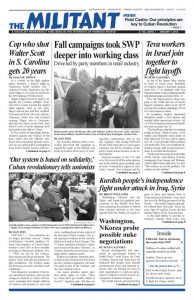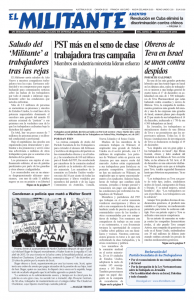Below is an excerpt from Aldabonazo: Inside the Cuban Revolutionary Underground, 1952-58, a Participant’s Account by Armando Hart. Hart, who helped found the July 26 Movement and led its urban underground, died in Havana Nov. 26. After the overthrow of the U.S.-backed Batista dictatorship in 1959, Hart served as Minister of Education and later as Minister of Culture in the new revolutionary government and spent decades in the central leadership of the Communist Party of Cuba. The Militant is publishing a series of excerpts from his book. This selection, titled “Manifesto to the Nation: Response to the Miami Pact,” was drafted by Fidel Castro, the revolution’s central leader, in collaboration with Hart and other leaders of the July 26 Movement, and released Dec. 14, 1957.
The manifesto repudiates the Miami Pact, referred to here as the “unity document,” which was an agreement among bourgeois opposition forces that contained both public and private clauses, after its drafters falsely claimed it had been signed onto by leaders of the July 26 Movement. Copyright © 2004 by Pathfinder Press. Reprinted with permission.
❖
No matter how desperate our situation in face of thousands of the dictatorship’s troops mobilized to annihilate us, and perhaps with more determination because of it (since nothing is more humiliating than to accept an onerous condition under trying circumstances), we would never accept the sacrifice of certain principles that are fundamental to our conception of the Cuban Revolution. These principles are contained in the Manifesto of the Sierra Maestra.
To omit from the unity document the explicit declaration that we reject every form of foreign intervention in the internal affairs of Cuba is a sign of lukewarm patriotism and of cowardice, which must be condemned in and of itself.
Declaring that we are opposed to intervention is not simply asking that there be no intervention in support of the revolution, which would undercut our sovereignty and undermine a principle that affects all the peoples of the Americas. It also means opposing all intervention on the side of the dictatorship by supplying the planes, bombs, tanks, and modern weapons that maintain it in power. No one knows this better than we do, not to mention the peasants of the Sierra, who have suffered it in their own flesh and blood.
In short, ending such intervention means achieving the overthrow of the dictatorship. Are we such cowards that we won’t even demand no intervention on the side of Batista? …
The unity document omits the explicit rejection of any kind of military junta as a provisional government of the republic.
The worst thing that could happen to Cuba at the present time would be the replacement of Batista by a military junta, as this would be accompanied by the deceptive illusion that the nation’s problems had been resolved by the dictator’s absence. …
We do not hesitate to declare that if a military junta replaces Batista, the July 26 Movement will resolutely continue its struggle for liberation. It is preferable to do battle today than to fall into a new and insurmountable abyss tomorrow. …
If one lacks faith in the people, if one lacks confidence in their great reserves of energy and struggle, then one has no right to interfere with their destiny, distorting and misdirecting it during the most heroic and promising moments of the republic’s life. Keep the revolutionary process free of all dirty politicking, all childish ambitions, all lust for personal gain, all attempts to divide up the spoils beforehand. Men are dying in Cuba for something better. …
Another point that is equally unacceptable to the July 26 Movement is secret provision number 8, which states: “The revolutionary forces are to be incorporated, with their weapons, into the regular armed bodies of the republic.” …
Our experience in the territory dominated by our forces has taught us that the maintenance of public order is a key question for the country. Events have shown us that as soon as the prevailing order is eliminated, a series of problems are unleashed and crime, if left unchecked, sprouts up all over. It was the timely application of severe measures, with full public blessing, that put an end to the outbreak of banditry. …
Anarchy is the worst enemy of a revolutionary process. To combat it from now on is a fundamental need. Whoever does not understand this has no concern for the fate of the revolution, and those who have not sacrificed for the revolution, logically enough, do not share this concern. The country needs to know that there will be justice, but under the strictest order. Crime will be punished no matter where it comes from.
The July 26 Movement claims for itself the role of maintaining public order and reorganizing the armed forces of the republic.
- Because it is the only organization that possesses organized and disciplined militias throughout the country, as well as an army in the field, with twenty victories over the enemy.
- Because our combatants have demonstrated a spirit of chivalry free of all hatred toward the military, invariably respecting the lives of prisoners, tending their wounded, never torturing an adversary, even when they are known to possess important information. And they have maintained this conduct with an unprecedented equanimity.
- Because the armed forces must be imbued with the spirit of justice and nobility that the July 26 Movement has instilled in its own soldiers.
- Because the calmness with which we have acted in this struggle is the best guarantee that honorable military men have nothing to fear from the revolution. …
It is the members of the July 26 Movement alone who have spread rebellion from the wild mountains of Oriente to the western provinces of the country. It is the members of the July 26 Movement alone who are carrying out sabotage, the execution of assassins, the burning of cane fields, and other revolutionary acts. It is the July 26 Movement alone that has been able to organize workers in revolutionary action throughout the nation. It is also the July 26 Movement alone that today can carry out the strategy of strike committees. And it is the July 26 Movement alone that has helped organize the Civic Resistance Movement, which today groups together the civic sectors in almost all the localities of Cuba. …
We are prepared, even if alone, to triumph or die. The struggle will never be as difficult as it was when we were only twelve men; when we did not have a people organized and tempered by war throughout the Sierra; when we did not have, as today, a powerful and disciplined organization throughout the country; when we did not possess the formidable mass support demonstrated at the time of the death of our unforgettable Frank País.
To die with dignity does not require company.
Fidel Castro Ruz
For the National Directorate of the July 26 Movement,
Sierra Maestra, December 14, 1957

